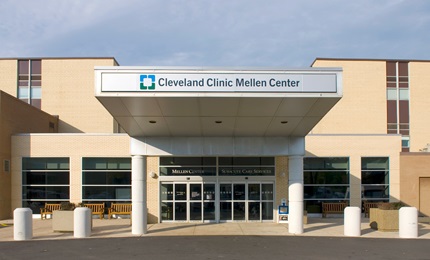As promised I have made my slides available.
The objective of the meeting was to stimulate discussion and get consensus on going beyond typical treatment guidelines for managing people with MS. Can we push the envelope to improve MS outcomes? I am sure we can we just need to change our treatment target beyond what we are prepared to accept today. Despite this, I get the impression that most neurologists seem to target short-term goals, i.e. NEDA over the next year or two. I personally think we should be ‘maximizing brain health’ over the life of our patients. It is our responsibility to make sure we prevent end-organ damage so that our patients get to old age with as much brain as possible to age normally. What do you think?
I had the opportunity of visiting the Mellen MS Centre, which provides quite an exceptional MS service. I was bowled over by how many resources are at hand at the Centre; we could only dream of having similar resources in ‘austerity NHS’. For example, there are full-time technicians who assess patients at each visit using a standardised battery of outcome measures. The results of these outcomes with their MRI scans are immediately uploaded into the electronic medical record so that they can impact on decisions there and then; i.e. at the same clinic visit. In comparison, within the NHS there is a neuro-radiology backlog that means that it typically takes weeks to get our MRI reports back. The latter is not the fault of neuroradiology; there is simply not enough neuroradiology consultants.
We are in the process of implementing an asynchronous system where our patients will come up about a month before their annual clinic appointment to have an MS MOT*; i.e. to have all their outcome measures done, including their MRI, blood monitoring and possibly a lumbar puncture for CSF neurofilament levels. They will then come back for the follow-up appointment with all the data ready for assessment. This will helpfully standardise the annual follow-up assessments. In addition to this, we are designing a programme for our patients to prepare for this annual assessment. They will need to come to the clinic with a list of objectives and what they want the appointment to achieve.
It is becoming clear that standardising MS management is one way of reducing the variation in the way we manage MS across the UK.
* MOT = The MOT test (Ministry of Transport, or simply MOT) is an annual test of vehicle safety, roadworthiness aspects and exhaust emissions required in the United Kingdom for most vehicles over three years old used on any way defined as a road in the Road Traffic Act 1988.
ProfG
.fa {
padding: 10px;
font-size: 20px;
width: 20px;
text-align: center;
text-decoration: none;
margin: 5px 2px;
border-radius: 50%;
}
.fa:hover {
opacity: 0.7;
}
.fa-facebook {
background: #3B5998;
color: white;
}
.fa-twitter {
background: #55ACEE;
color: white;
}
.fa-google {
background: #dd4b39;
color: white;
}
.fa-linkedin {
background: #007bb5;
color: white;
}
.fa-youtube {
background: #bb0000;
color: white;
}
.fa-instagram {
background: #125688;
color: white;
}
.fa-pinterest {
background: #cb2027;
color: white;
}
.fa-snapchat-ghost {
background: #fffc00;
color: white;
text-shadow: -1px 0 black, 0 1px black, 1px 0 black, 0 -1px black;
}
.fa-skype {
background: #00aff0;
color: white;
}
.fa-android {
background: #a4c639;
color: white;
}
.fa-dribbble {
background: #ea4c89;
color: white;
}
.fa-medium {
background: #000000;
color: white;
}
.fa-tumblr {
background: #2c4762;
color: white;
}
.fa-vine {
background: #00b489;
color: white;
}
.fa-foursquare {
background: #45bbff;
color: white;
}
.fa-stumbleupon {
background: #eb4924;
color: white;
}
.fa-flickr {
background: #f40083;
color: white;
}
.fa-yahoo {
background: #430297;
color: white;
}
.fa-soundcloud {
background: #ff5500;
color: white;
}
.fa-reddit {
background: #ff5700;
color: white;
}
.fa-rss {
background: #ff6600;
color: white;
}

I've heard in the USA the testing for patients is very thorough because it is private healthcare, more tests mean more money and sometimes tests are done which aren't really needed. What do you think?
I agree with your comment. All this doesn't come without a price tag. MS centers do these tests and then charge the insurance companies. Depending on the coverage, either the insurance company pays or defers the payment to the patient. It can end up with huge out of pocket expenses. Either way the MS center makes profit!
I am drawn to comment on several levels:IT/pedagogy (I'm an ex-computer lecturer) I viewed all 38 slides but wanted, so wanted, to hear what you were saying. The Notes attached to each slide can say that. Google voice to text is *really, really* doing well as the Google slide I just made https://docs.google.com/presentation/d/1UljW7wPe0a4S-Wefp2rEJPyVuLToLU4Sk3Ek60kz5sU shows. The text is *totally* untouched by human hands.Secondly as a 67 yo advanced (EDSS 8.5) pwMS. In Australia my neurologist kept me on Betaferon until the final end of ambulation – yr+13 in terms of Slide 10Thanks again Gavin
Do most target NEDA? Last time I checked neurologists were too busy to give you an annual MRI? Even if you get one they don't look at it. The MOT you have described would be amazing, but it sounds like blue sky thinking. On a less destructive note… There was the post on the MS registry, which I looked at, and will probably join. The PIS mentioned that they pulled data from your clinical team, would it be possible for this to be bi-directional and the data that the patient feeds in get passed back to the clinical database. In that capacity you would already have access to a massive battery of subjective outcome measures for each patient, which the registry funds so no extra NHS burden… Similarly the registry data might improve as Id be more likely to fill it in if it offered the potential to improve my own outcomes (altruistic intent aside ;-)).